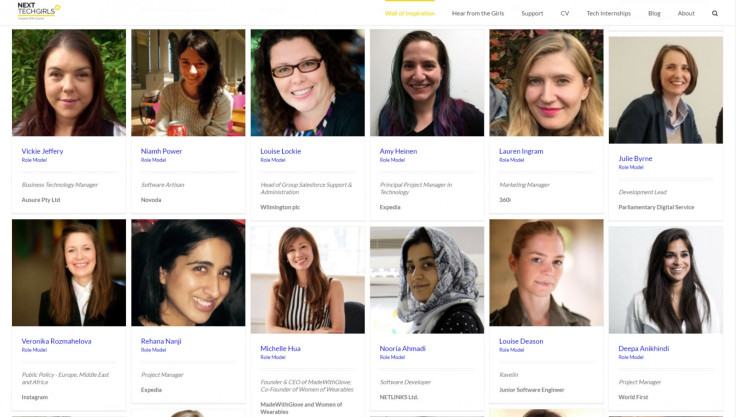International Women's Day: We need more women in STEM, and this is how you can help
The tech industry needs more visible female role models to help girls see that careers in STEM are viable.
Positive progress is being made to increase the number of women working in Science, Technology, Engineering and Mathematics (STEM) industries, but there is still quite a way to go because there just aren't enough visible female role models for young girls.
A survey of women technologists conducted by QA, a technology training and apprenticeship organisation in the UK that trains over 200,00 delegates and places 10,000 young people into tech apprenticeships a year has found that 50% were actively discouraged from entering technology career paths, while 76% did not see technology as an attractive career when they were in school.
At the moment, women make up only 17% of the total UK tech force. Fewer than one in 10 of these women are in leadership positions in the industry, and only 4% of all software engineers and 20% of all tech founders are women, according to the BCS Chartered Institute for IT's Women in IT scorecard for 2016.
"When I went to university, it just wasn't a possibility. Having us being able to be visible not just with university students but also with young children, to show that this really is possible… I often get asked, 'Do you really work for IBM? You must be a real geek,'" Sonia Cyrus, a client engagement manager for IBM's Bluemix Garage told IBTimes UK at a Women in Tech event held in London to celebrate the release of the Hidden Figures film, which highlights the key role of women at Nasa during the 1960s space race.
"All the stereotypes come out. Just by having a presence and being able to have that dialogue with people and change their perceptions about what a career in STEM means, that's the key thing we need to be advocating."
Not enough role models for girls, but you can help

Part of the problem is that children and young women do not have enough access to female role models in STEM industries to help them see that working in these fields is not only acceptable for women but also attractive as a career path.
Some effort has been made to combat this problem. For example, in September 2016, a specialist computing college called Ada – The National College for Digital Skills opened in Tottenham Hale, Haringey. The college received £18m ($22m) in funding from the Mayor of London and offers in software programming, data science, app development and games design to help fill the digital skills gap.
We talk about getting women back into the workplace, but we never talk about how we get men out of the workplace. The way we can make it more normal for women in the workplace is to make it more normal for men to have extended parental leave,
"We need help. We need people coming in. As a teacher, I cannot teach the breadth of what computer science is nowadays, and I need help. I'd like to challenge [women working in STEM] to come speak at Ada. We've got the next cohort of people who are going to be your interns, graduates and apprentices. We really do need help from the experts out there," said Tine Gotschi, head of computer science at Ada – The National College for Digital Skills.
"An hour or a day of your time, anything, because that's the kind of thing that money can't buy. We can go out, get money and hire computer science teachers, but we can't get that expertise in security, bitcoin or blockchain."
Change comes from within, and the industry itself has a key role to play in improving equality and diversity. Thankfully, some firms are already making an effort. For example, IBM runs ambassador programmes with school outreach and mentoring led by female employees, and the tech recruiter Empiric is running the Next Tech Girls initiative to help highlight female tech role models as well as increasing tech work experience placements for 15-year-old girls in the UK.
Meanwhile, UK tech sector trade body techUK is focusing on helping adult women change careers to enter the tech sector, as well as women who are seeking to re-enter the industry after having children, by encouraging its 900 tech company members to build networks to retrain and progress more female talent.
Men are the best feminists

However, this isn't just a problem that concerns women – men need to be involved to in order for change to happen.
I’d like to challenge [women working in STEM] to come speak at Ada. We really do need help from the experts out there. An hour or a day of your time, anything, because that’s the kind of thing that money can’t buy,
"As well as super women, we need super men. When talk about parenthood, we talk about getting women back into the workplace, but we never talk about how we get men out of the workplace. The way we can make it more normal for women in the workplace is to make it more normal for men to have extended parental leave, to make it more normal for men to leave work early to pick up their children," said Hollie Cummins, a technical lead at IBM's Blumix Garage.
Maila Reeves, the regional director of Forward Ladies and the European representative of the Commonwealth Businesswomen's Network, which is part of the main governance body on gender for the 52 Commonwealth governments, agrees: "The best feminists are men. That's the reality. We need men to advocate in order to move the agenda forward. I have always focused on engaging with men as much as with women. Let's face it – without the support of men, who in many cases are the decision makers, the agenda is not going to move forward."
© Copyright IBTimes 2025. All rights reserved.





















